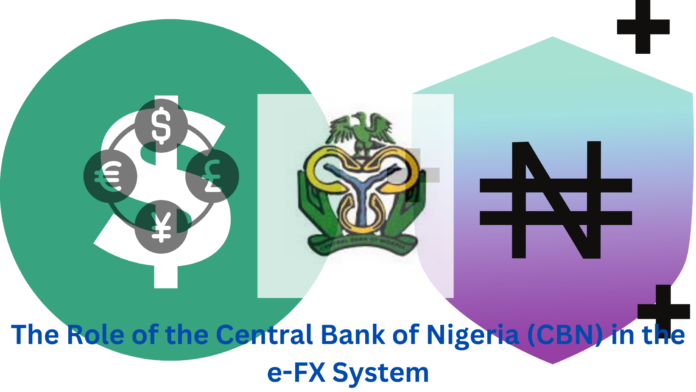The Role of the Central Bank of Nigeria (CBN) in the e-FX System can not be over emphasized. Nigeria’s foreign exchange market has undergone transformative reforms to meet the demands of an evolving economy. One of the most impactful advancements is the Electronic Foreign Exchange Matching System (e-FX). At the heart of this development is the Central Bank of Nigeria (CBN), a regulator and innovator that ensures the efficiency, transparency, and stability of the forex market.
This blog dives deep into the role of the CBN in implementing and regulating the e-FX system, exploring its benefits, operational framework, challenges, and its significance in shaping Nigeria’s economic landscape.
Understanding the e-FX System in Nigeria
The Electronic Foreign Exchange Matching System is a digital platform developed to automate and enhance the process of forex trading. Designed to create a transparent and efficient market environment, the e-FX system matches currency buyers with sellers based on real-time data, ensuring competitive rates and minimizing manual interventions.
Key features include:
- Automated Matching: Eliminates manual transactions, reducing delays and errors.
- Real-Time Trading: Facilitates transactions at prevailing market rates.
- Transparency: Provides a clear view of market activities for all participants.
For more information, visit Understanding the e-FX System.
CBN’s Objectives in the e-FX System
The CBN introduced the e-FX system to achieve several strategic goals:
- Foster Transparency: The e-FX system eliminates discretionary practices that previously influenced forex pricing.
- Improve Market Efficiency: Automated systems reduce transaction times and increase liquidity in the market.
- Align with Global Standards: By implementing a system akin to those in developed economies, Nigeria enhances investor confidence and attracts foreign investments.
- Boost Economic Stability: Stabilizing exchange rates strengthens economic growth and international trade.
CBN’s Operational Role
The CBN performs multiple critical functions in the e-FX system:
1. Regulatory Oversight
The CBN monitors all activities within the e-FX platform to ensure compliance with forex trading guidelines. This involves:
- Auditing trades to prevent fraudulent practices.
- Enforcing anti-money laundering (AML) measures.
- Regulating access to the platform to prevent unauthorized usage.
2. Policy Formulation
The CBN regularly updates forex policies to reflect market dynamics. For instance:
- Allocating forex quotas to different sectors.
- Determining eligible participants (e.g., banks, corporate entities).
- Introducing policies to support the naira’s stability.
3. Technology Deployment
The CBN collaborates with technology providers to maintain and upgrade the e-FX platform. Key priorities include:
- Ensuring robust cybersecurity measures.
- Enhancing user experience through interface upgrades.
4. Data Analysis and Reporting
Data from the e-FX system is analyzed to inform policymaking. The CBN uses this data to monitor currency flow, detect market trends, and adjust strategies accordingly.
Benefits of the CBN’s Role in the e-FX System
| Benefits | Impact |
|---|---|
| Market Transparency | Builds trust among participants and curtails fraud. |
| Competitive Pricing | Ensures fair rates driven by market demand and supply. |
| Enhanced Liquidity | Attracts more participants, increasing transaction volumes. |
| Economic Growth | Encourages foreign investments and stabilizes the naira. |
| Regulatory Compliance | Ensures alignment with international financial standards. |
Challenges Faced by the CBN in Managing the e-FX System
While the e-FX system has revolutionized forex trading in Nigeria, it faces several challenges:
1. Forex Shortages
Limited availability of forex due to declining oil revenues impacts the system’s efficiency.
2. Resistance from Legacy Systems
Some stakeholders, particularly those benefiting from opaque practices, resist adopting the e-FX platform.
3. Technological Hurdles
The need for continuous updates and robust cybersecurity can strain resources.
4. Exchange Rate Volatility
External factors, such as global economic conditions, often disrupt the stability the system aims to achieve.
CBN’s Strategic Responses
To address these challenges, the CBN has implemented several measures:
- Increased Forex Supply: Through policies that encourage diaspora remittances and export earnings.
- Public Awareness Campaigns: Educating stakeholders on the benefits of the e-FX system.
- Technological Investments: Partnering with global fintech firms to enhance system capabilities.
- Policy Revisions: Adjusting forex allocation strategies to reflect current economic realities.
Global Comparisons: Nigeria’s e-FX System in Context
The CBN’s initiative mirrors global best practices, such as:
- Reuters Matching: A widely-used forex trading platform in developed economies.
- EBS Market: A platform that sets benchmarks for speed, transparency, and reliability.
These systems provide inspiration for further enhancements to Nigeria’s e-FX system.
Infographic: The Role of the CBN in e-FX
| CBN Function | Description |
|---|---|
| Regulatory Oversight | Ensures compliance and monitors transactions. |
| Technology Management | Maintains the platform’s security and usability. |
| Policy Enforcement | Implements rules to stabilize the forex market. |
| Data Analytics | Uses insights for better market regulation. |
Economic Impact of the e-FX System
The e-FX system supports the Nigerian economy by:
- Encouraging Foreign Investment: Transparent forex markets attract international investors.
- Supporting Trade: Businesses benefit from predictable exchange rates.
- Strengthening the Naira: Reduced speculation leads to greater currency stability.
Future of the e-FX System
Short-Term Goals
- Increase user adoption among banks and businesses.
- Reduce technical downtimes and improve reliability.
Long-Term Vision
- Integrate with global forex markets to enable seamless international trade.
- Expand access to include retail users, fostering financial inclusion.
Learn More
- For detailed insights, read further to learn more about the Electronic Foreign Exchange Matching Sysyhttps://windetop.com/understanding-the-electronic-foreign-exchange-matching-system-in-nigeria/ or Understanding e-FX in Nigeria.
- Stay updated with international forex trends on Bloomberg.
The Central Bank of Nigeria’s role in the e-FX system underscores its commitment to fostering a robust financial ecosystem. By addressing challenges and leveraging technology, the CBN positions Nigeria as a leader in forex market innovation.All these were in a bid to enhance the Role of the Central Bank of Nigeria (CBN) in the e-FX System.


